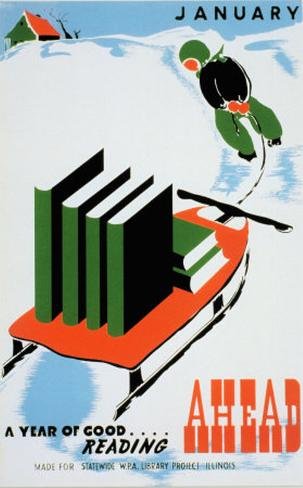A Year of Good Reading Ahead
A new opportunity for reading is on the horizon.
In the United States during the Great Depression in the late 1930s, a federal agency, the Works Progress Administration (later renamed the Work Projects Administration) was set up and employed millions of Americans for various public works projects. One of those projects engaged artists, including to create illustrations and posters for various arts centers, museums and other public spaces. An iconic poster resulting from this work advertised “A Year of Good Reading Ahead”on behalf of public libraries in the state of Illinois.
Books or articles on career and professional issues are a great way to start the year.
In that spirit, consider what may be some options for reading that reflect your professional interests, goals or challenges. A few of my favorites this year have included:
Chatter: The Voice in Our Heads, Why it Matters, and How to Harness It
“Our verbal stream plays an indispensable role in the creation of our selves,” advises author Ethan Kross, a psychologist and neurologist at the University of Michigan, where he focuses his professional research on the study of how to confront negative thoughts. To that end, in this book, referencing both his professional scientific experience and anecdotes from his and others’ lives, Kross describes how we can reduce those negative thoughts and respond better to them when they seem to overwhelm us. Mixing descriptions of brain function and memory with a conversational, relaxed writing style, this is a great read for anyone who wonders why certain feelings and internal dialogue can take center stage in our minds.
Working Identity: Unconventional Strategies for Reinventing Your Career
If you enjoy Harvard Business Review case studies that analyze how someone transforms their career or approach to their work, then Herminia Ibarra’s book may be the next one to put on your list. Ibarra, currently a professor of organizational behavior at London Business School, and formerly at Harvard Business School, confronts a key issue for many professionals: what to do when you want to make a change in your work life but are not sure what that change may be. Her thesis posits that the solution may lie in being less concerned about arriving at a single, light-bulb, “a-ha!” career-defining moment and and instead recognizing a more cyclical and iterative process for change. The nine “unconventional strategies” she defines also suggest powerful ways to move forward by recognizing the patterns, habits and assumptions that may be the very things holding us back.
Chained to the Desk: A Guide for Workaholics, Their Partners and Children, and the Clinicians Who Treat Them
If you are at the office at midnight on yet another day, or on a plane again when you promised to be home early, both exhausted and proud of your hard work ethic, this could be the book for you. Bryan Robinson, professor emeritus at the University of North Carolina at Charlotte, and a psychotherapist in private practice, wrote this book because he saw clients who neglected their family or social relationships due to work, letting work take over every aspect of their lives. Differentiating between people who work hard and people who let, even invite their work to control them, Robinson explores the impact of the latter on their own health and that of the people around them. He describes work addiction as the “glorification of an illness” and walks through in this book how to treat it as such, and find ways to begin to understand and recover from it.

